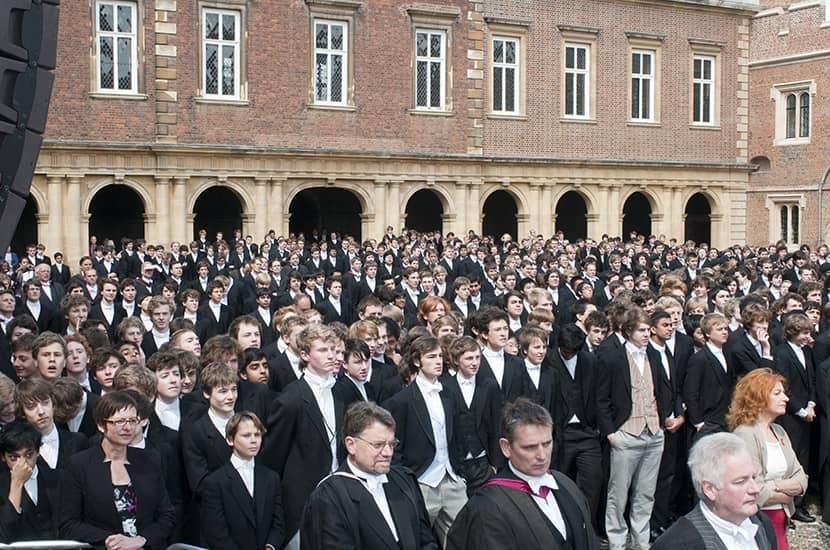I can’t recall reading an angrier book than this. Richard Beard has written what I hope for his sake is a cathartic denunciation of the private boarding school system, and his rage is on two fronts. The first is how being sent away at the age of eight damaged and twisted him and just about everyone else who experienced the same; the second is about what these damaged children as adults have done to the country. He pays special attention to the Prime Minister and his predecessor but one.
I suspect that The Spectator has quite a few readers who went to boarding school, and who even think the government is doing a good job. So you may either have given up on this review already or will have no intention of reading the book. But that would be a pity, because you would be missing out on one of the finest polemics I have ever come across.
It is a passionate, well-argued case against a system by which a pool of less than 5 per cent of the population have a disproportionate influence over every significant aspect of our lives. It is also a system which instils in these people dissembling, hypocrisy, snobbery, moral blindness and indifference to anyone else’ssuffering. Think of the Prime Minister’sand Foreign Secretary’s decisions to go on holiday just as Afghanistan was about to be catapulted back to the Middle Ages.
This book clarifies much: the smirking of Boris Johnson, Dominic Raab and Matt Hancock — they simply don’t care. The reason Johnson is the suboptimal person he is — the kind who refuses to tell us even how many children he has — is because he’s still at school. Even his hair is still at school. And a particular kind of school. In Beard’s words:
It is noticeable, and often noticed, that something immature and boyish survives in men like Cameron and Johnson as adults. They can never quite carry off the role of grown-up, or shake a suspicion that they remain fans of escapades without consequences.
Beard begins his book in the grounds of Radley College, his alma mater; since a divorce, he has moved to within walking distance of the school. What’s that all about? Coincidence, he says. Hmm. ‘It’s as much of a coincidence as when a man marries a woman with the same first name as his mother.’ He notices during his lockdown walks around the grounds that they are much larger than he remembers. What, too, is that all about? It’s usually the other way round; and Sad Little Men is, in part, an acknowledgment that one’s schooldays loom larger in one’s life than one thought.
His 1970s education was rooted in a world of familiar anachronism in which huge areas on maps were still coloured pink and where the second world war was being fought in the form of miniature Commando comic books. His armoury now consists of quotations from Orwell, Arendt and Erving Goffman (particularly his book on the inmates of mental asylums and other ‘total institutions’), and, pertinently, Nigel Molesworth. (Oddly, he doesn’t once mention Lindsay Anderson’s 1968 film If...).
His book makes the same point again and again with elegant variation because it’s a point that needs thrashing into us: that the system produces damaged men who are nevertheless encouraged to believe they can run the country. Since there is no longer the colonial service for them to enter, the country they end up damaging is their own.
I suffered a similar education, though in a much diluted form: I went home after school every day. But my public school still fostered the same kind of arrogance and sense of entitlement. (Actually we felt so superior we regarded Etonians as overprivileged dolts, which may give a clue as to which school it was. As a result we have not fiddled so much with the levers of power: that sort of thing is beneath us.)
It didn’t take me long — thanks, paradoxically, to the habit of critical thinking the better teachers tried to instil in us — to work out that the system was deeply flawed, grossly unfair and probably the biggest single factor in making this country so particularly screwed up. Like George Bernard Shaw, I want to see the public schools razed to the ground and their foundations sown with salt, and have felt like this for more than four decades. Which is not unusual for a product of public school — but not usual enough, alas.
I imagine that many will dismiss this book’s premise and conclusions with sentiments that could be summarised as ‘didn’t do me any harm’ or ‘made me the success I am’. But for me, Sad Little Men has been an eye-opener. I may not have suffered the emotional damage caused by early boarding, but I now recognise in myself traits of arrogance and entitlement, and am aware of the damage you can do to others if you think you can go through life without suffering consequences. At least I hurt only myself and those near to me, and not an entire nation.






Comments